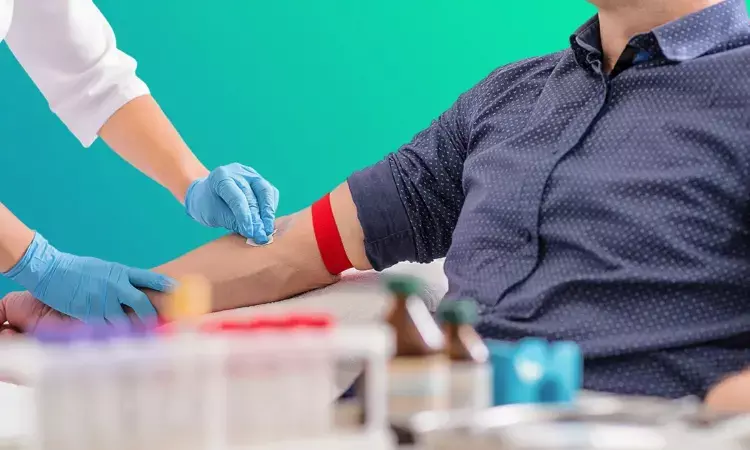- Home
- Medical news & Guidelines
- Anesthesiology
- Cardiology and CTVS
- Critical Care
- Dentistry
- Dermatology
- Diabetes and Endocrinology
- ENT
- Gastroenterology
- Medicine
- Nephrology
- Neurology
- Obstretics-Gynaecology
- Oncology
- Ophthalmology
- Orthopaedics
- Pediatrics-Neonatology
- Psychiatry
- Pulmonology
- Radiology
- Surgery
- Urology
- Laboratory Medicine
- Diet
- Nursing
- Paramedical
- Physiotherapy
- Health news
- Fact Check
- Bone Health Fact Check
- Brain Health Fact Check
- Cancer Related Fact Check
- Child Care Fact Check
- Dental and oral health fact check
- Diabetes and metabolic health fact check
- Diet and Nutrition Fact Check
- Eye and ENT Care Fact Check
- Fitness fact check
- Gut health fact check
- Heart health fact check
- Kidney health fact check
- Medical education fact check
- Men's health fact check
- Respiratory fact check
- Skin and hair care fact check
- Vaccine and Immunization fact check
- Women's health fact check
- AYUSH
- State News
- Andaman and Nicobar Islands
- Andhra Pradesh
- Arunachal Pradesh
- Assam
- Bihar
- Chandigarh
- Chattisgarh
- Dadra and Nagar Haveli
- Daman and Diu
- Delhi
- Goa
- Gujarat
- Haryana
- Himachal Pradesh
- Jammu & Kashmir
- Jharkhand
- Karnataka
- Kerala
- Ladakh
- Lakshadweep
- Madhya Pradesh
- Maharashtra
- Manipur
- Meghalaya
- Mizoram
- Nagaland
- Odisha
- Puducherry
- Punjab
- Rajasthan
- Sikkim
- Tamil Nadu
- Telangana
- Tripura
- Uttar Pradesh
- Uttrakhand
- West Bengal
- Medical Education
- Industry
Fasting blood sugar variability linked with cancer risk in patients with type 2 diabetes

China: Long-term changes in fasting blood sugar are positively associated with the risk of cancer in type 2 diabetes patients, a recent study in the Journal of Diabetes has found. Variability in fasting blood sugar is shown to independently predict cancer incidence.
Previous studies have shown a consistent increase in cancer among patients with type 2 diabetes mellitus (T2DM). Studies have reported that fasting blood sugar level is independently associated with the risk of cancer onset. Besides fasting blood sugar level alone, fasting blood sugar (FBG) variability may contribute more to increasing cancer onset due to inflammation pathways and oxidative stress.
There is no clarity on the association between long-term changes in FBG and cancer. Prior studies have mainly relied on the relationship between FBG variability and specific site of cancers and have been conducted on populations without diabetes. Also, there is a scarcity of population-based studies on the dose-response relationship between FBG variability and cancer in T2DM patients.
Against the above background, Xiao-rui Cui and colleagues from China aimed to examine the correlation between long-term FBG variability and cancer incidence in patients with type 2 diabetes. They also discussed the interaction of variability in fasting blood sugar with hypertension and FBG-mean with hypertension on cancer risk.
For this purpose, the researchers collected data from 46 761 patients with T2DM aged between 20–80 years who were participants in the Diabetes Standardized Management Program in Shanghai, China. To describe FBG variability, four indicators were adopted, including coefficient of variation (CV), average real variability (ARV), standard deviation (SD), and variation independent of the mean (VIM). The association between long-term fasting blood sugar variability and cancer risk was investigated. The interactive effect of FBG variability was determined with hypertension and FBG-mean with hypertension on the risk of cancer, respectively.
The study led to the following findings:
- Over a median follow-up of 2.86 years, the authors confirmed 2218 cancer cases (51.1% male).
- People in the highest quartile of FBG variability had a raised cancer risk versus those in the lowest quartile.
- The nonlinear association was observed using FBG-VIM, FBG-ARV, and FBG-SD in restricted cubic spline plots.
- The authors observed a significant interaction effect of fasting blood sugar variability with hypertension on cancer, whereas the impact of FBG-mean with hypertension did not attain significance.
The study demonstrated a positive association of fasting blood sugar variability with increased hazards of all-sites cancer. When measurements differ, a nonlinear and linear link was found between FBG variability and cancer.
"The findings imply that long-term changes in FBG variability may be used for identifying T2D patients who are at high risk of cancer and should be targeted for treatment to prevent cancer," the authors wrote. "We found a negative interaction between fasting blood sugar variability and comorbidity of hypertension on cancer risk."
Reference:
The study, "Long-term fasting glucose variability and risk of cancer in patients with type 2 diabetes mellitus: A retrospective population-based cohort study in Shanghai," was published in the Journal of Diabetes.
DOI: https://doi.org/10.1111/1753-0407.13329
Dr Kartikeya Kohli is an Internal Medicine Consultant at Sitaram Bhartia Hospital in Delhi with super speciality training in Nephrology. He has worked with various eminent hospitals like Indraprastha Apollo Hospital, Sir Gangaram Hospital. He holds an MBBS from Kasturba Medical College Manipal, DNB Internal Medicine, Post Graduate Diploma in Clinical Research and Business Development, Fellow DNB Nephrology, MRCP and ECFMG Certification. He has been closely associated with India Medical Association South Delhi Branch and Delhi Medical Association and has been organising continuing medical education programs on their behalf from time to time. Further he has been contributing medical articles for their newsletters as well. He is also associated with electronic media and TV for conduction and presentation of health programs. He has been associated with Medical Dialogues for last 3 years and contributing articles on regular basis.
Dr Kamal Kant Kohli-MBBS, DTCD- a chest specialist with more than 30 years of practice and a flair for writing clinical articles, Dr Kamal Kant Kohli joined Medical Dialogues as a Chief Editor of Medical News. Besides writing articles, as an editor, he proofreads and verifies all the medical content published on Medical Dialogues including those coming from journals, studies,medical conferences,guidelines etc. Email: drkohli@medicaldialogues.in. Contact no. 011-43720751


